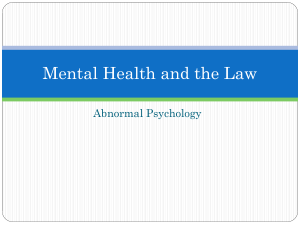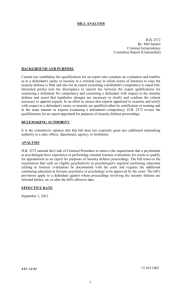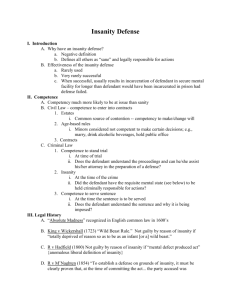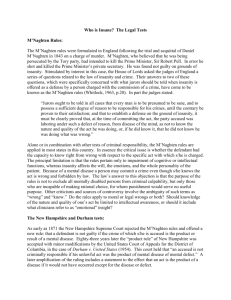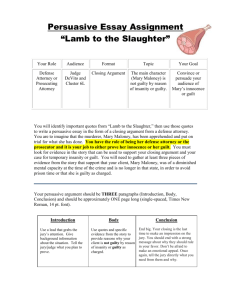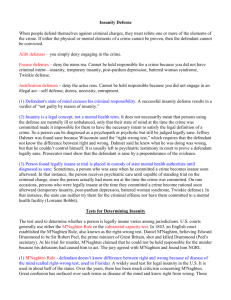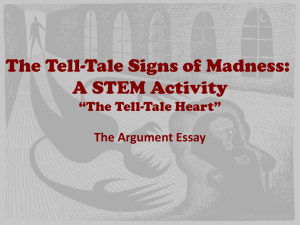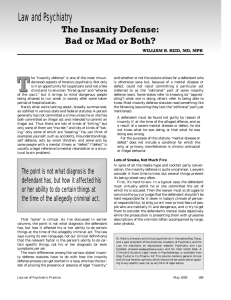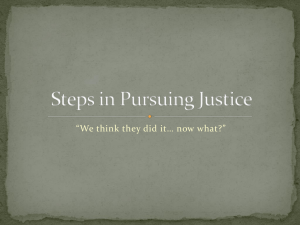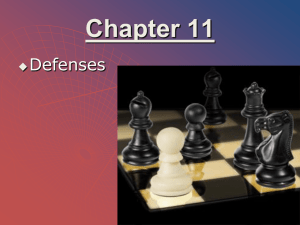IF A MAN BE MAD
advertisement
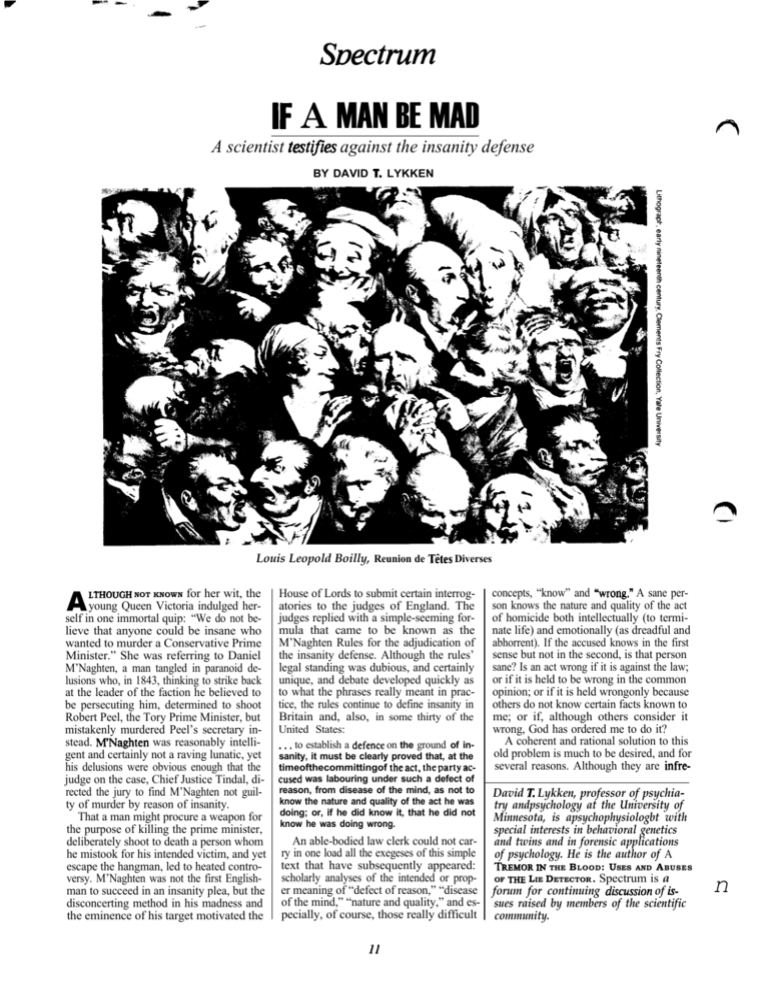
IF A MAN BE MAD A scientist testljks against the insanity defense BY DAVID 1. LYKKEN Louis Leopold Boilly, Reunion de T&es Diverses A young Queen Victoria indulged herself in one immortal quip: “We do not beLTHOUGH NOT KNOWN for her wit, the House of Lords to submit certain interrogatories to the judges of England. The judges replied with a simple-seeming formula that came to be known as the M’Naghten Rules for the adjudication of the insanity defense. Although the rules’ legal standing was dubious, and certainly unique, and debate developed quickly as to what the phrases really meant in practice, the rules continue to define insanity in Britain and, also, in some thirty of the concepts, “know” and Ywrong.n A sane person knows the nature and quality of the act of homicide both intellectually (to terminate life) and emotionally (as dreadful and abhorrent). If the accused knows in the first sense but not in the second, is that person sane? Is an act wrong if it is against the law; or if it is held to be wrong in the common opinion; or if it is held wrongonly because others do not know certain facts known to me; or if, although others consider it wrong, God has ordered me to do it? A coherent and rational solution to this old problem is much to be desired, and for several reasons. Although they are infre- lieve that anyone could be insane who wanted to murder a Conservative Prime Minister.” She was referring to Daniel M’Naghten, a man tangled in paranoid delusions who, in 1843, thinking to strike back at the leader of the faction he believed to be persecuting him, determined to shoot Robert Peel, the Tory Prime Minister, but mistakenly murdered Peel’s secretary in- United States: stead. MNaghten was reasonably intelli..* to establish a defence on the ground of ingent and certainly not a raving lunatic, yet sanity, it must be clearly proved that, at the his delusions were obvious enough that the timeofthecommittingof theact, thepartyacjudge on the case, Chief Justice Tindal, di- cused was labouring under such a defect of rected the jury to find M’Naghten not guil- reason, from disease of the mind, as not to David T. Lykken, professor of psychiaknow the nature and quality of the act he was ty of murder by reason of insanity. try andpsychology at the University of That a man might procure a weapon for doing; or, if he did know it, that he did not Minnesota, is apsychophysiologbt with the purpose of killing the prime minister, know he was doing wrong. special interests in behavioral genetics An able-bodied law clerk could not car- and twins and in forensic applications deliberately shoot to death a person whom he mistook for his intended victim, and yet ry in one load all the exegeses of this simple of psychology. He is the author of A text that have subsequently appeared: TREMOR IN THE B LOOD: USES AND A BUSES escape the hangman, led to heated controscholarly analyses of the intended or prop- OF THE LIE DETECTOR . Spectrum is a versy. M’Naghten was not the first Englishman to succeed in an insanity plea, but the er meaning of “defect of reason,” “disease forum for continuing dkcussion of isdisconcerting method in his madness and of the mind,” “nature and quality,” and es- sues raised by members of the scientific the eminence of his target motivated the pecially, of course, those really difficult community. II n Spectrum quent, trials involving the insanity defense are protracted and expensive for all concerned. Psychiatry is displayed to bad advantage in the inevitable battle of expert witnesses. Most seriously, public respect for the law itself is injured whenever some obvious scoundrel attempts the insanity defense, even though these attempts very seldom succeed. In Minneapolis recently, a young hoodlum in a stolen car shot the police officer who stopped him for questioning, and then had the public defender register a plea of not guilty by reason of insanity on the grounds that he had been “high” on drugs that day and was therefore not responsible. That such a maneuver is possible might well lead the dead officer’s colleagues to find justification for administering their own punishments in the future. John W. Hinckley, Jr. tried to assassinate President Reagan and almost succeeded; one of his three victims lost a part of his brain that can never be replaced. The act was committed before television cameras and the perpetrator apprehended on the spot, gun in hand. Now, as this article goes to press, Hinckley’s trial is in its third expensive week. He has pleaded insanity, and the prosecution is laboring to refute the claim that he was not responsible for his actions. Eminent psychiatrists have testified for both sides, confidently asserting plausible, yet contradictory, opinions. I find it hard n, to believe that this defense will succeed, but the mere fact that it can be attempted jeopardizes the vital consensus of confidence in the rule of law. What if the prosecution blunders on some technicality and the court is forced to find this man not guilty of a crime that millions of citizens witnessed on television? Could the American justice system survive such humiliation? n % beenhappywith the M’Naghten Rules nor with the A concept of insanity itself, since it does not LIENISTSHNE~~ER n correspond to any psychiatric category. Persons who were plainly psychotic have failed the M’Naghten test as, indeed, MNaghten, who was a paranoid psychotic, probably would have failed it himself had the rules been formulated earlier. A liberalization to include the idea of irresistible impulse has often been urged, sometimes successfully. American courts have tended to be more liberal (that is, more amenable to psychiatric opinion) than the British, beginning as early as 1869, with New Hampshire v. Pike, in which the appellate court ruled that the defendant should be acquitted if “the killing was the offspring or product of mental disease.” Similarly, in a decision now known as the Durham Rule, Judge David Bazelon, in a District of Columbia case, concluded in 1954 that “an accused is not criminally responsible if his , unlawful act was the product of mental disease or mental defect.” But many courts, reflecting as they must the general opinion, have resisted such lib eralization. Counsel for Robert Pate, on trial in 1850 for the high misdemeanor of striking Queen Victoria with his walking stick, claimed irresistible impulse, but Baron Alderson, presiding, retorted, “A man might say that he picked a pocket from some uncontrollable impulse, and in that case the law would have an uncontrollable impulse to punish him for it.” The Durham Rule seems a perilously slippery slope, for there is probably no crime that, in the psychologist’s perspective, would not appear to be the product of mental disease or defect. This is easily demonstrated by trying to imagine what category of offender a psychiatrist would reject as mentally healthy and thus outside his jurisdiction. The psychiatrist might say that he or she lacks the facilities necessary for treating this problem, or does not have a treatment, or that the defect that led to the criminal behavior has now spontaneouslyremitted. But thepsychiatrist iscommitted to the deterministic view that all aberrant behavior is the product of aberrant psychological states or processes that, in principle, could be remedied. The law’s premises are more complicated than psychiatry’s. Fist is the ancient doctrine of just deserts, which probably reflects the need for the Ring’s justice to satisfy the public outrage lest citizens be too tempted to take justice back into their own hands. Second is the principle of deterrence. The miscreant and others who might be similarly tempted must be shown that such behavior will be punished. The deterrent effect equals the severity of the punishment multiplied by the presumed probability of getting caught. Since we are surprisingly inefficient at catching criminals, we try to compensate by punishing more harshly the ones we catch. The third premise of the criminal law is that society should be protected by the segregation of dangerous persons. Finally, there is the principle ofrehabiiitation. Here, at least, the law stands shoulder to shoulder with psychiatry but its shoulders have slumped in discouragement in recent years. Rehabilitation does not seem to be working. For every inmate who completes a sentence with newly acquired job skills and a determination to go straight, there seems to be at least one other whose prison experience has so twisted or embittered him that he is now less likely to reform than if he had never been caught in the first place. In earlier times, concern about the insanity defense centered on the issue of capital punishment. When Eliza Dart, in a fit 12 of postpartum depression, drowned her infant child, hoping thereby to protect it from a sinful world, no reasonable person in Victorian England wanted Dart to hang on the same gibbet with a murderous highwayman. Yet even with the decreasing use of the death sentence, debate on this question remains vigorous, although the insanity defense is actually seldom offered and rarely sustained. Moreover, its success seems frequently to be an academic question from the viewpoint of the accused, since the only difference it makes to the accused is whether the grim institution in which he or she is incarcerated is called a prison or a hospital. A defendant who is plainly psychotic is unlikely now even to come to trial, but instead will be committed to a psychiatric hospital as unfit, by reason of mental illness, to assist in his or her own defense. Our mistake, perhaps, has been to try to solve a legal problem with a psychiatric formula. The law wants to know who is responsible and who can be considered guilty of acrime. But psychiatry cannot make that distinction, cannot classify this act as determined and, therefore, guiltless, and that act as freely chosen and, therefore, blameworthy. If Dart intended that her child should die, then we must accept that she is guilty of the crime of murder. Defenders of the insanity plea resist this idea, confusing guilty (“having committed . . . a delinquency, crime, or sin”) with culpable (“deserving of punishment”). No doubt it is burdensome to have it recorded that one was guilty of murder, even if one is never punished for it. But it is also burdensome to be mentally ill (or to be murdered, for that matter), and the law cannot undertake to protect us from all the unhappy consequences of our misfortunes. The question of what Dart did or meant to do (mensrea) can properly be decided by a jury in the usual way. It is conceivable that psychiatric testimony might be relevant at this stage, but only in exceptional circumstances. In most cases, the question of mental illness ought to enter only later, after the facts of the case, of who did what to whom, have been decided. Once the defendant has been found guilty, the next step is to determine the proper disposition. Shall we sentence Dart to prison or shall we treat her depression and, when it has lifted, turn her loose? Shall we send Hinckley to the penitentiary for the statutory period, or shall we put him in a security hospital until the doctors are satisfied that he is no longer a menace to the community? These are decisions that a judge, advised by psychiatric experts, can probably arrive at more wisely than a jury can. Florida has experimented with a bifurcated trial system in which the question of Spectmm what happened is decided in stage one, while the question of insanity is threshed out by an adversarial process before the same jury in stage two. This would seem merely to prolong the agony without accomplishing any useful reform. Idaho’s legislature recently voted to abolish the insanity defense altogether, while permitting the judge to consider evidence of mental illness in deciding on the length and type of sentence. Here one might question the lack of any formal mechanism to ensure that the defendant has been competently examined and that the judge will receive good psychiatric advice. menstrual tension had made them act out of character.” Since there was no dispute as to the facts in either case, it can be presumed that both women would have pleaded guilty in my jurisdiction, thus avoiding the expenses of the stage-one trial. Were I sitting on the panel at the stagetwo hearing, I would listen sympathetically to expert testimony that, in some women, the hormonal tides preceding menstruation yield such a turmoil of emotion as might compel anyone to violence. I would suggest that the defendant be held in custody for several months of endocrinological study to determine if, in fact, her premenstrual changes were out of the ordinary range. If not, I would recommend the standard sentence for her offense. If the tests were positive, a regimen of monthly progesterone injections or other treatment could be implemented and tested for effectiveness by observing her behavior during, say, a year in a security hospital. On her release, I would recommend indefinite probation during which she would be required to present herself each month for prophylactic treatment. These measures would have no retributive intent but instead would be a reasonable response to the fact that, left to herself, the woman was periodically dangerous. What about the law’s agenda, those hard questions of fair punishment and adequate deterrence? The sense of fairness is most HE DEFECTSOFBOTHSYSTEMS might be T circumvented by a modification of the two-stage process. If the defendant did the deed and meant to do it (as distinguished from an inadvertance or an accident), then he or she would be found guilty by a jury in stage one. Stage two would be designated as a hearing rather than a trial, and the jury would be replaced by a court-appointed panel of, say, two board-certified psychiatrists, a penologist or parole-board member, a police official (to help squelch police complaints of “coddling”), and one strongminded lay person. Defense counsel would offer witnesses, including psychiatric experts, but the panel would be permitted to question them directly. The object of this hearing would be, first, to determine whether the crime was a product of an identifiable mental disorder; if not, sentencing would proceed in the ordinary way. If the defendant is held to have been mentally ill when the crime was committed, the panel would make recommendations as to disposition, with dissenting opinions permitted. The judge would make the final decision, and the court’s overriding concern would be the public safety. Should it be concluded that the crime was a result of some treatable disorder, a security hospital could be given the responsibility both to treat the illness and to determine when a cure had been effected and the patient could safely be released. Deranged but untreatable miscreants might be remitted to a hospital for custody rather than treatment, if it were felt that they would be a danger to themselves or others in a prison setting, or that they would continue to be a danger to society if released at the end of the normal prison term. Let’s test this proposal by imagining how it might deal with the trendy insanity defense based on the effects of premenstrual tension. According to a recent New York Times report, “Two women walked free from British criminal courts in November after having killed or threatened to kill. They were released after pleading that pre- I Benjamin Rush’s Tranquillizing Chair, 1810 13 outraged when the client of a clever (and expensive) attorney is found to be “not guilty by reason of insanity.” Even in Victorian times, alienists were pointing to defendants’ long histories of immoral and violent behavior as evidence of mental disease, leading critics to suggest that previous depravity is acurious basis on which to beg forgiveness for a present offense. In the system recommended here, this sort of thing should never happen. The question of deterrence concerns whether an onlooker might be led to sup pose that he or she, too, could yield to some criminal impulse and yet avoid punishment. One wonders if this ever really happens, whether anyone reading about a successful insanity defense has cold-bloodedly proceeded with some outrage, planning to feign insanity as an escape route. Even if it seldom happens, as I would suppose, the fact that this seems a possibility to the ordinary citizen and imperils respect for the criminal justice system is sufficient cause for concern. Placing the final decision in the hands of the judge rather than the jury would seem to obviate this problem also. No clever lawyer will “get me off on an insanity plea; if I commit a crime and am discovered, I will be found guilty. If I then suppose that, unassisted by legal technicalities, I can mislead the judge and his or her expert advisers, I am probably mad after all. n ps =
